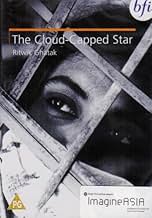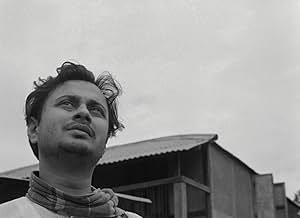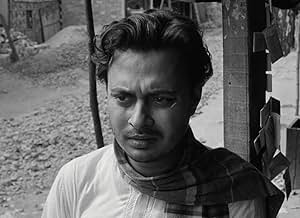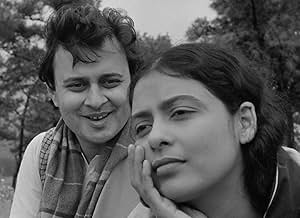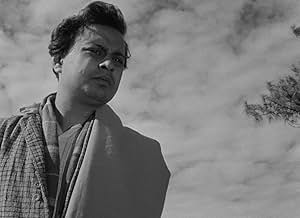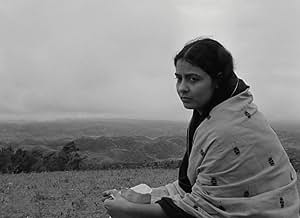PUNTUACIÓN EN IMDb
7,8/10
3,5 mil
TU PUNTUACIÓN
Añade un argumento en tu idiomaA selfless young woman (Supriya Choudhury) sacrifices her own happiness for her unappreciative family.A selfless young woman (Supriya Choudhury) sacrifices her own happiness for her unappreciative family.A selfless young woman (Supriya Choudhury) sacrifices her own happiness for her unappreciative family.
- Dirección
- Guión
- Reparto principal
- Premios
- 1 nominación en total
Ranen Ray Choudhury
- Baul singer
- (as Ranen Chowdhury)
Reseñas destacadas
The independence of India in August 1947 resulted in the partition of Bengal, a trauma etched in the minds of the people whose lives were changed forever. Nowhere is this upheaval better portrayed than in the films of Bengali director Ritwik Ghatak. An active Marxist who began his career in the Communist People's Theater, Ghatak's films never achieved widespread popularity but he is now considered to be one of the top Indian directors of the last half of the 20th century. His best known film, The Cloud-Capped Star, the first in a trilogy examining the economic effects of partition, is a powerful story about a young Indian women who sacrifices her education and marriage in order to hold her family together. Ghatak's inspiration for the character was a woman he saw at a bus stop whose beaten down appearance struck him as being typical of Bengali refugees.
Neeta (Supriya Choudhury) is the youngest daughter of a refugee family from East Pakistan who lives in a middle class home near Calcutta. Neeta is a college student whose brother Shankar (Anil Chaterjee) is a layabout, an aspiring singer who lives off the family while practicing his art and dreaming of a career on the concert stage. Neeta believes in her brother and loves him deeply but has to constantly fend off the complaints of both parents about his laziness. Neeta also has an attractive sister Gita (Gita Ghatak) and a brother Mantu (Dwiju Bhawal) who is also a promising student.
When her father (Bijon Battacharya) has a serious accident, Neeta is forced to give up her studies and find a job and Mantu gives up school to work in a factory. The father is dismayed by a world that no longer has a place for poetry or idealism and falls into a state of hopelessness. Neeta is a good-hearted young woman, but one who fails to consider her own needs and puts off plans for marriage with Sanat (Niranjan Ray), an intellectual studying for a Phd. Sanat, unwilling to wait for her, becomes infatuated with Neeta's sister Gita and they marry to Neeta's dismay. Even though Shankar eventually finds success in Bombay, Neeta's strain in having to hold the family together leads to serious illness and the family's burdens only increase.
The Cloud-Capped Star is an angry film and often bleak, but sudden bursts of sitar music and joyous singing by Shankar lighten the tone. Although the film can be overly melodramatic and unevenly acted, it contains an overriding humanism that is reminiscent of Satyajit Ray and the neo-realist films of the 40s and 50s. Ghatak's raw passion and compelling characters make it easy to overlook its flaws and the result is a tribute to the human spirit and a deeper understanding of the tragedy that partition brought to India.
Neeta (Supriya Choudhury) is the youngest daughter of a refugee family from East Pakistan who lives in a middle class home near Calcutta. Neeta is a college student whose brother Shankar (Anil Chaterjee) is a layabout, an aspiring singer who lives off the family while practicing his art and dreaming of a career on the concert stage. Neeta believes in her brother and loves him deeply but has to constantly fend off the complaints of both parents about his laziness. Neeta also has an attractive sister Gita (Gita Ghatak) and a brother Mantu (Dwiju Bhawal) who is also a promising student.
When her father (Bijon Battacharya) has a serious accident, Neeta is forced to give up her studies and find a job and Mantu gives up school to work in a factory. The father is dismayed by a world that no longer has a place for poetry or idealism and falls into a state of hopelessness. Neeta is a good-hearted young woman, but one who fails to consider her own needs and puts off plans for marriage with Sanat (Niranjan Ray), an intellectual studying for a Phd. Sanat, unwilling to wait for her, becomes infatuated with Neeta's sister Gita and they marry to Neeta's dismay. Even though Shankar eventually finds success in Bombay, Neeta's strain in having to hold the family together leads to serious illness and the family's burdens only increase.
The Cloud-Capped Star is an angry film and often bleak, but sudden bursts of sitar music and joyous singing by Shankar lighten the tone. Although the film can be overly melodramatic and unevenly acted, it contains an overriding humanism that is reminiscent of Satyajit Ray and the neo-realist films of the 40s and 50s. Ghatak's raw passion and compelling characters make it easy to overlook its flaws and the result is a tribute to the human spirit and a deeper understanding of the tragedy that partition brought to India.
If Satyajit Ray is the virtuoso of Indian cinema, Ghatak is the maverick. His films aren't as polished or subtle as Ray's, but he takes bold chances. Most blatantly in the sound design, with startling (and often beautiful) use of music, ambient noise, reverb, and effects that are almost sci-fi. Perhaps only Lynch is as distinctive in the employment of audio techniques. Not all of Ghatak's gambles pay off. Take, for instance, his insistence on casting the goofy Bijon Bhattacharya in most of his films. Bhattacharya's performance here isn't quite as damaging as his turn in THE GOLDEN THREAD, but it's easily the weakest aspect of the film. However, the primary focus is on Nita (Supriya Choudhury), the girl whose family walks all over her, and resent her for it in the process. As her brother chides her: "You'll suffer. Those who suffer, suffer forever." The family is a microcosm of Ghatak's obsession, the damage caused by the Partition, commenting on those who exploit the weak, and those who let themselves be exploited. It's high melodrama, but like Sirk, is done so artfully and effectively that it's a wonder to behold, with breathtaking images, unforgettable moments, and that idiosyncratic audio field.
'Meghe dhaka tara' or the 'Cloud-clapped Star' is definitely one of the best films ever directed in Bengali,and it vividly portrays the directing skills of Ritwik Ghatak. The story revolves around a lower-middle class Bengali family, who lived in the refugee colonies situated in the outskirts of Kolkata. The father of the family was a English teacher and his eldest son 'Shankar'(Anil Chatterjee) was a promising young classical singer while the youngest son 'Montu' played football. Nita and Gita were two sisters, the former being somewhat responsible, caring, loving while the latter was simply a beauty conscious,lazy, insincere flirt. Owing to circumstances, Nita had to work as a private-tutor in order to feed her family as no one else had any urge, capacity or rather consciousness about their poverty. Another important character of the movie was Sanat, a talented Physics research fellow whom Nita sponsored for she had affections on him. According to the story Nita a working woman, couldn't spare time on him and Gita, her sister began having relations with him and eventually they married. Nita was heartbroken and neither Sankar nor their father supported their marriage. Sanat after his marriage didn't continue his research and found himself a job of high salary. Eventually Sankar established himself as a singer, Montu found a job in a factory, while Nita's health began deteriorating. It was found she was suffering from TB. She was sent to a sanatorium upon the mountains to recover and the film ends with Nita's death. One the last scenes perhaps the best of the film wonderfully shows Nita's love for life, her urge for struggle and her positive thinking. The film's one of the most impressing assets is the song, 'Je raate mor duar Guli' song beautifully by Debabrata Biswas. It was really suitable with the sad situation after Gita's marriage. The film over all portrays the life-struggle of a promising family with contemporary middle class livelihood. Actings of Anil Chatterjee and Supriya Devi is of high quality and the over all direction, screen-play, music equally good. The 'Lost Love' by William Wordsworth finds a perfect match in the movie.
If I have to chose one movie in my life then it would be this. Ultimate cinematic experience would be an under statement as it is more than that. I can think of Ritwik as the Indian answer to Stanley Kubrick. Meghey Dhaka Tara is like Clockwork Orange made by an equally eccentric and obscure genius, whose impact is appreciated much after his death. The contrast is, unlike Kubrick, very few people know about him as the rating shows here where as, it should have been in the cannon of every cinephile around the world. It is the responsibility of those few of us who have watched it, to spread it. I would like to spend some time here discussing what is so special about the movie.
First of all it is a movie that celebrates beauty. The beauty of nature as captured by some of the breath taking shots of trees that I have ever seen in a movie, the beauty in the affection between the brother and sister eating together side by side, or the face of Neeta gleaming under the sun when Sanat arrives or the beauty captured in Neeta's sister in front of the mirror. It also portrays the beauty in people's mind through many side characters like the compassion of the strict shop keeper. Yet, this beauty both in natural and in human spirit is in sharp contrast with the abject poverty and the bleak refugee colony. Nature plays an intricate role in many of his cinemas like Ajantrik and it often highlights the character and gives it also a context, done in the most effective and subtle way.
The second quality of this movie is the usage of classical music so deliberately for mood change. It reminds me of Kubrick. But here it is done in an much more open fashion. It creates a sense of happiness (read beauty) and often there is a sudden inflection or a discontinuity as if to remind the audience the harsh reality. (there is also a piece of great folk song as well).
The third quality of the movie is it's simplicity and honesty to the subject. Here the movie almost attained the quality of a real documentary. The effect of partition on the Bengali people have never been captured so authentically as been done here, the characters so identifiable, the story so representative and the settings so familiar.
The fourth and true to the identity of the genre it belongs to, this movie is a cinematographic excellence. If Kubrick is fascinated with back-motion and checkered pattern, then Ritwik has his play with frames and off center photography. Here each frame tells more than one story and a face is never complete with the surroundings and is part of it, not the center of it. Also there are other aspects of it like there are meaning to be understood by relating the context and what been showed, something Satyajit is very good at, Ritwik great at and been taken to extreme by Mrinal Sen.
The fifth and most touching part of it is the storyline. It is at the end of the day a very human movie. It talks about individual family and individuals in normal relationship in normal acts of life and in normal background. In that way it touches your heart seeing the struggle and the suffering. It does so without being too apparent or getting too sentimental.
The greatness of this movie lies in achieving all the above qualities in one work of art. It appeals to all the senses and linger long in your mind. One viewing is not enough to comprehend it fully like all great movies as there are many things in it that get revealed only after repeated viewing
First of all it is a movie that celebrates beauty. The beauty of nature as captured by some of the breath taking shots of trees that I have ever seen in a movie, the beauty in the affection between the brother and sister eating together side by side, or the face of Neeta gleaming under the sun when Sanat arrives or the beauty captured in Neeta's sister in front of the mirror. It also portrays the beauty in people's mind through many side characters like the compassion of the strict shop keeper. Yet, this beauty both in natural and in human spirit is in sharp contrast with the abject poverty and the bleak refugee colony. Nature plays an intricate role in many of his cinemas like Ajantrik and it often highlights the character and gives it also a context, done in the most effective and subtle way.
The second quality of this movie is the usage of classical music so deliberately for mood change. It reminds me of Kubrick. But here it is done in an much more open fashion. It creates a sense of happiness (read beauty) and often there is a sudden inflection or a discontinuity as if to remind the audience the harsh reality. (there is also a piece of great folk song as well).
The third quality of the movie is it's simplicity and honesty to the subject. Here the movie almost attained the quality of a real documentary. The effect of partition on the Bengali people have never been captured so authentically as been done here, the characters so identifiable, the story so representative and the settings so familiar.
The fourth and true to the identity of the genre it belongs to, this movie is a cinematographic excellence. If Kubrick is fascinated with back-motion and checkered pattern, then Ritwik has his play with frames and off center photography. Here each frame tells more than one story and a face is never complete with the surroundings and is part of it, not the center of it. Also there are other aspects of it like there are meaning to be understood by relating the context and what been showed, something Satyajit is very good at, Ritwik great at and been taken to extreme by Mrinal Sen.
The fifth and most touching part of it is the storyline. It is at the end of the day a very human movie. It talks about individual family and individuals in normal relationship in normal acts of life and in normal background. In that way it touches your heart seeing the struggle and the suffering. It does so without being too apparent or getting too sentimental.
The greatness of this movie lies in achieving all the above qualities in one work of art. It appeals to all the senses and linger long in your mind. One viewing is not enough to comprehend it fully like all great movies as there are many things in it that get revealed only after repeated viewing
it's just that he made films for the love of it and never for anyone else that this somewhat forgotten legend later realised to be great made such a deep film.This film is not about cinematography unlike ray's but this is about the script.The scene where the father say's "you bore the burden and now you are the burden,you shall go' is a landmark in itself.Especially the believe in her somewhat useless brother who becomes a gr8singer in bollywood .This film has to be seen without any distractions.i give film -10 ,script -11, and cinematography -9 all out of 10.The background music is amazing ,it;s tearful.After ,watching i am almost compelled to take up a camera and shoot a film for myself.I don't care about this plastic world anymore.
¿Sabías que...?
- CuriosidadesMeghe Dhaka Tara (1960) is part of the Criterion Collection, spine #993.
- PifiasWhen Nita meets her former lover at the tree near the pond (after about 90 minutes), a microphone is visible in the top left corner.
- Citas
Baul singer: [singing] I wasted all my good days, Now, in bad times, I've come to the river's edge, Boatman, I don't know your name, Who shall I call out to? Who shall I call out to? Oh, my heart, who will take you across? There is a boat but no boatman, There is no one on the river bank, There is no one on the river bank...
- ConexionesFeatured in La historia del cine: una odisea: New Directors, New Form (2011)
Selecciones populares
Inicia sesión para calificar y añadir a tu lista para recibir recomendaciones personalizadas
- How long is The Cloud-Capped Star?Con tecnología de Alexa
Detalles
- Fecha de lanzamiento
- País de origen
- Sitio oficial
- Idiomas
- Títulos en diferentes países
- The Cloud-Capped Star
- Empresa productora
- Ver más compañías en los créditos en IMDbPro
- Duración2 horas 6 minutos
- Color
- Mezcla de sonido
- Relación de aspecto
- 1.33 : 1
Contribuir a esta página
Sugerir un cambio o añadir el contenido que falta


